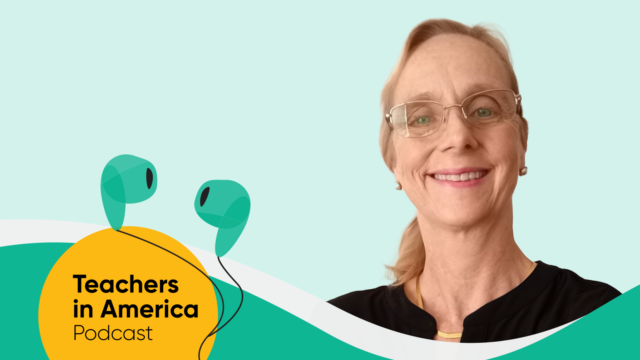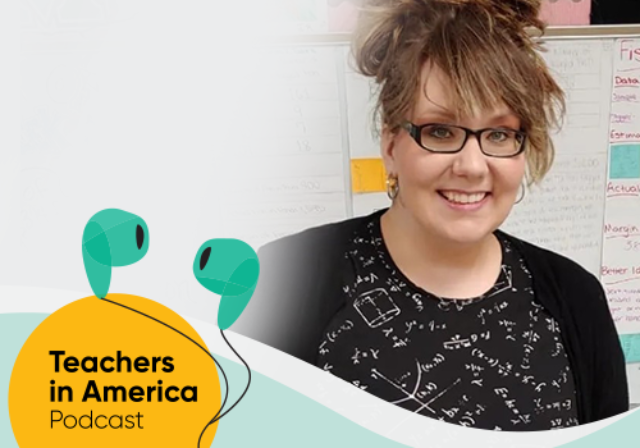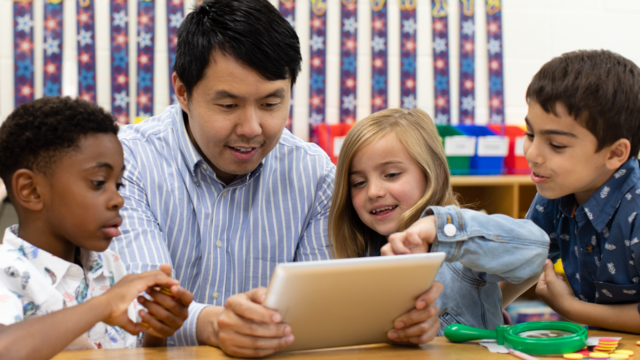
Welcome to HMH's podcasts, focused on the ever-changing learning landscape. From educators in the classroom to leaders outside the field of education, each episode is a chance to create connections, hear stories, and explore the ideas and innovations that will improve student outcomes and influence the future of K-12 education.
Join us on Teachers in America to hear the incredible stories of real teachers. By connecting with educators across the country, our hosts explore ideas about incorporating A.I. into classroom lessons, improving student outcomes, and building a growth mindset. Subscribe now to Teachers in America on Apple Podcasts, Spotify, or wherever you listen to podcasts.
Check out the Shaping the Future podcast to hear from innovators, experts, and industry leaders. Host Matthew Mugo Fields explores the future beyond the classroom and seeks to understand what an unpredictable future might hold for our students.
Teachers in America Season 7

In this bite-sized episode, host Kailey Rhodes sits down with Andrew Goldman, founder of Writable and EVP of HMH Labs. Together, they dig deeper into HMH's Educator Confidence Report survey results and share what educators really think about AI use in schools.

Secondary math teacher Russell Hanes joins us and gives insight on how to build students' confidence in math by embracing mistakes and shifting their mindset to see themselves as "math people."

Leadership expert, educator, and Center for Model Schools senior fellow Dr. Mary Hemphill shares how to leverage the unique instructional practice of the One-Minute Meeting to engage and empower students as school stakeholders.

In this bite-sized episode, we will be zeroing in on educator's top concerns, their views of the profession, and what we can do to make it better. We'll dive into HMH's Educator Confidence Report, which surveys educators about the issues that impact them daily and asks them how we can improve the profession going forward.

Middle school math teacher Camyrea Barnes shares advice on how to nurture students' growth mindset and how to build community with students and fellow teachers.

Peninsula School District leaders Kris Hagel and John Yellowlees join us to discuss how to integrate and embrace AI in education. Plus, they share leading principles and strategies to guide students in using AI ethically.

Photo courtesy of Leeping Lenses Photography.
2024 National Teacher of the Year Missy Testerman joins us and offers words of inspiration and practical advice to nurture the joy in teaching. Plus, she shares tips on teacher mentoring, getting ready for the back-to-school season, and supporting multilingual learners.

We’re kicking off our season with third-grade teacher Mary Martinez Crippen from Miami, Florida. Mary became a viral sensation when she began tracking football stats with her class. In this episode, Mary gives advice on how to incorporate personal passions into your instruction, how to connect classroom learning to the real world, and how to include football into your own lessons.
Teachers in America Season 6

2024 Illinois State Teacher of the Year Briana Morales shares how she uses healing-centered engagement and storytelling to empower her students. Plus she shares writing activities to engage students in identity work and how to start a classroom dignity closet to help students in need.

HMH Teacher Ambassador Abbey Behnke shares instructional strategies and activities to engage students in vocabulary learning. Plus, she discusses how vocabulary is a catalyst for building reading comprehension skills.

In honor of 2024 Teacher Appreciation Week, Secretary of Education Miguel Cardona joins HMH CEO Jack Lynch to discuss pressing issues in education, such as integrating AI in the classroom, tackling teacher burnout, and building respect for the teaching profession.

Third grade teacher and HMH Teacher Ambassador Latonia Grant discusses how data has been a valuable tool in her planning and instruction. Plus she shares data-driven planning tips, like how to lead data talks with students and how to collaboratively plan with peers.

Broward County Public Schools Teacher of the Year Dr. Claudia Singkornrat gives insight on her school’s 4-day schedule and how it impacts student learning.

Kindergarten teacher Melissa Hawkins joins us from Hawai'i to discuss student engagement, literacy instruction, and connecting with families.

Middle school math intervention teacher Melody Jacklin shares strategies on creating relevant and meaningful math lessons, incorporating STEM challenges in math instruction, and getting students comfortable with productive struggle.
Teachers in America Season 5

Photo: Reading intervention teacher Jennifer "Jennie" Mau
Reading intervention teacher Jennie Mau reflects on her 35-year career in education and shares her favorite reading instructional strategies and tools that have helped her students thrive.

Sherrye Scott transitioned from a career in computer information systems to education. Sherrye shares how she motivates students to learn and succeed as a math intervention teacher.

Photo: High school principal and cultural leader Dr. Artley Skenandore
Oneida Nation High School principal and cultural leader Dr. Artley Skenandore shares how he encourages students to stay connected to their Oneida history, culture, and language. Plus he provides strategies on how to honor Native American heritage in the month of November and all year long.

Photo: Assistant principal Randolph Hull and reading intervention teacher Joshua Bzovi
Assistant principal Randolph Hull and reading intervention teacher Joshua Bzovi from the South Redford District in Michigan share how they’ve teamed up to support their middle school students in reading.

Photo: Adapted physical education teacher Eric Cavalli
Adapted physical education teacher Eric Cavalli from Manor, Texas shares strategies to create an accessible learning environment for students.

Photo: Dual language kindergarten teacher Blanca Hernandez
Texas dual language kindergarten teacher Blanca Hernandez shares how she builds a bilingual classroom culture that fosters a growth mindset in English and Spanish.

Photo: K-5 literacy fellow Kayla Dyer
Burrillville School District literacy fellow and HMH Teacher Ambassador Kayla Dyer discusses writing teaching strategies to successfully guide students through the writing process.

Photo: Third-grade teacher Russell Souders
Third-grade Texas teacher Russell Souders shares tips on how he sparks students’ interest in reading, including how he uses programs like HMH Into Reading to engage students in literacy instruction.

Photo: Past NSTA president and HMH Into Science Texas author Dr. Karen Ostlund
Past NSTA President and HMH Into Science Texas author Dr. Karen Ostlund joins us to discuss the ins-and-outs of NGSS standards, technology's impact on student agency, and more.

Photo: Fourth-grade teacher Teresa Meredith
30-year seasoned teacher and HMH Teacher Contributor Teresa Meredith shares her expertise on creating a classroom community space and establishing expectations in the first weeks of school.

Photo: High school English teacher Leah Carper
In this 13-minute minisode, North Carolina State Teacher of the Year Leah Carper joins us again and talks about strategies that have been successful with her Gen Z students.

Photo: Fourth-grade teacher Toney Jackson
Fourth-grade teacher and HMH ambassador Toney Jackson returns and shares tips to start off the school year as a Teacher MC, including how to empower students by sharing the stage and how to find your teaching crew.

Photo: Elementary literacy coordinator Dr. Jake Downs
Utah elementary literacy coordinator and education podcaster Dr. Jake Downs talks about best practices for literacy instruction, the science of reading, and data-based decision-making to help struggling readers.

Photo: Second-grade teacher David Staton
Ohio teacher, David Staton, shares how he personalizes writing instruction and keeps students engaged in the last days of school.

Photo: First-grade teacher Amber Reyes
Colorado teacher, Amber Reyes, shares strategies to engage students in fun phonics instruction, as well as resources to build fundamental reading skills.

Secretary of Education Miguel Cardona shares his 2023 Teacher Appreciation Week message and details the Department of Education's "Raise the Bar: Lead the World" effort.

Photo: Interventionist Becky Walker
Interventionist Becky Walker discusses how she leverages technology to differentiate instruction for her diverse student population.

Photo: Fourth-grade teacher Teresa Meredith
Thirty-year seasoned teacher Teresa Meredith shares best practices to build positive relationships with fellow educators on and offline.

Photo: Education leaders Rachael Cunningham and Sarah Fox
Education leaders Rachael Cunningham and Sarah Fox dispel common misconceptions about dyslexia and share best practices and programs to support dyslexic learners.

Photo: High school English teacher Leah Carper
2023 North Carolina State Teacher of the Year Leah Carper shares how she's learned to leverage technology in her classroom.

Photo: Fourth-grade teacher Toney Jackson
New Jersey teacher MC and poet Toney Jackson shares how he uses rhymes and raps to differentiate instruction to help meet the needs of all his students.

Photo: Fifth-grade teacher Rachel Guilfoyle
2022 DoDEA Teacher of the Year, Rachel Guilfoyle joins us from South Korea to discuss how she creates an inclusive classroom for her military-connected students.

Mother-daughter educators Darla Moyers (left) and Renae Kuhn (right).
Mother-daughter duo, Darla Moyers and Renae Kuhn from WV and VA, share a passion for education. In this episode of Teachers in America, they discuss their teaching journeys and touch on everything from student agency to blended learning.

Photo: Middle school math teacher Velnetta Runyon
Velnetta Runyon’s goal is to show students not to be afraid of math. She ensures that her middle schoolers are believed in and are pushed to their fullest potential. In this episode, see how she teaches perseverance from the first day of school.

Teacher and author of "I Wish My Teacher Knew", Kyle Schwartz, discusses how she helps students feel empowered to make a difference.

When customs broker Stacy Salter took on teaching elementary as a second career, she had to learn the ins and outs of classroom management to build student relationships.

Educator couple Rachel Lamb and Steven Lamb join us for a special episode on EdTech and Virtual Team Teaching.

Between their raised planters, vertical gardens, and hydroponic learning lab, Melissa Tracy and her high school students grow enough leafy greens to help feed the local community.

Hawai’i State Teacher of the Year Whitney Aragaki joins us for a discussion on place-based learning, her student-led science curriculum, and teacher mentoring.

Special guest U.S. Secretary of Education Miguel Cardona explains why now is the most impactful time to become a teacher.

From a museum to a bakery to a carnival, Autumn Dvorak's classroom transformations use hands-on projects and games to get her students excited about learning.

Pennsylvania educator Samuel Gonzalez has been teaching for just two years, and all while studying for his doctorate and serving in the National Guard.

We're kicking off season 4 with Chicago Public Schools teacher Misty Richmond, who discusses how she gets her students invested in STEM careers.

Elementary teacher Kitty Donohoe joins us for a discussion on reading, looping with her class, and her debut children’s novel, How to Ride a Dragonfly.

Photo: Hannah French in the woods where she teaches her students year-round.
Meet fourth grade teacher Hannah French, who has moved many of her classes into the woods nearby. There, students engage in location-specific challenges, journaling, and free play.

Meet Qorsho Hassan, a second grade teacher and the 2020 Minnesota Teacher of the Year. On this episode we discuss the importance of independent reading, identity, and representation for our students.

Photo: Perry Hollins encourages independent thinking in his students.
Meet Perry Hollins, a fourth grade teacher and former DJ who has spent the past 11 years infusing an African-centered pedagogy into the curriculum. Perry utilizes his education to create a culturally responsive, project-based learning environment for independent, flexible thinkers.

From the Teachers in America podcast archives, we bring you one of our favorite episodes--an interview with Juliana Urtubey, the upcoming 2024 Model Schools Conference closing keynote speaker and former National Teacher of the Year.
Teachers in America Seasons 1 & 2
We debuted Teachers in America in May 2019 with season one of our cornerstone series, Teachers in America, featuring educators who discuss real classroom experiences. We are so honored to share their stories with you. Listen to earlier seasons on Apple Podcasts, Spotify, or wherever you listen to podcasts.

Meet Karen Johnston, an elementary school teacher at Harriet Tubman Montessori in New Orleans, Louisiana. Karen helps build a comfortable and open learning environment for her students by utilizing student-directed activities in mixed grade level classes.

Meet Kelly Harper, a third-grade teacher at Mary Bethune Elementary in Atlanta, Georgia. After winning the 2019 District of Columbia Teacher of the Year Award and being named one of four finalists for the 2019 National Teacher of the Year, Kelly moved to Atlanta, where she employs social-emotional learning to work toward dismantling the school-to-prison pipeline.

Meet Sarah Lerner, an advisor for the award-winning yearbook Aerie and an English and journalism teacher at Marjory Stoneman Douglas High School in Parkland, Florida. Sarah is passionate about mental health and advocating for gun reform and oversaw the publication of the student written anthology Parkland Speaks.
We're excited to have EVP and General Manager Matthew Mugo Fields join us for Shaping the FutureTM season 2 as he interviews industry experts on topics that range from artificial intelligence to cyber security in schools. Subscribe to Shaping the Future on Apple Podcasts, Spotify, or wherever you listen to podcasts.

Meet Shellye Archambeau, former CEO of MetricStream and author of the book Unapologetically Ambitious. In this episode we learn how to encourage our students to be future leaders.

How can we introduce more emotion to the AI space? Our guest this week, Rana el Kaliouby, seeks to answer that question. Founder of Affectiva and author of Girl Decoded breaks down ethics and equity in tech.

We are joined by the Kennedy Center’s vice president and artistic director for social impact, Marc Bamuthi Joseph. A National Poetry Slam champion and a TED Global Fellow, Marc discusses the future of social impact and the role of the arts in public healing.

Season 2 of the Shaping the Future Podcast kicks off with special guest Dr. Tal Ben-Shahar, author of Happier and co-founder of the Happiness Studies Academy. Join host Matthew Mugo Fields as he asks about anti-fragility and the elements of happiness.
Shaping the Future Season 1
Shaping the Future season 1 is hosted by Dr. David Dockterman (Dock), an education lecturer at the Harvard Graduate School of Education, as he talks to both education experts and thought leaders from other industries. Together, they examine leading K-12 industry issues and offer insights for educators to best shape the future of education. Listen here to learn about the future of the workforce, civics education in a changing world, and media literacy in the digital era.
***
Please consider rating, reviewing, and sharing Teachers in America and Shaping the Future with your network. We value our listeners' support and feedback. Email us at Shaped@hmhco.com.
This page was originally published on May 6, 2019, and has been updated multiple times since publication.
SHAPING THE FUTURE is a trademark of Houghton Mifflin Harcourt Publishing Company.
Get tips to boost student engagement in your school with our FREE ebook.












